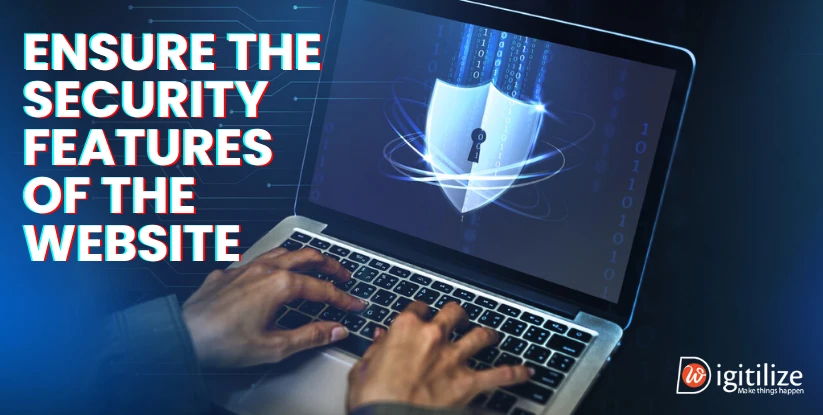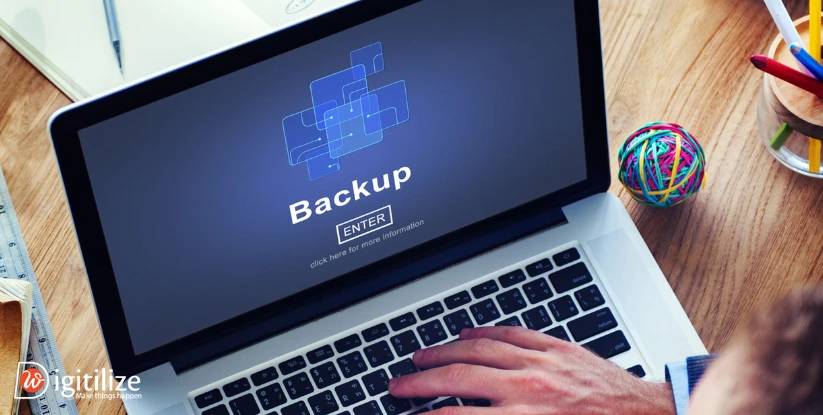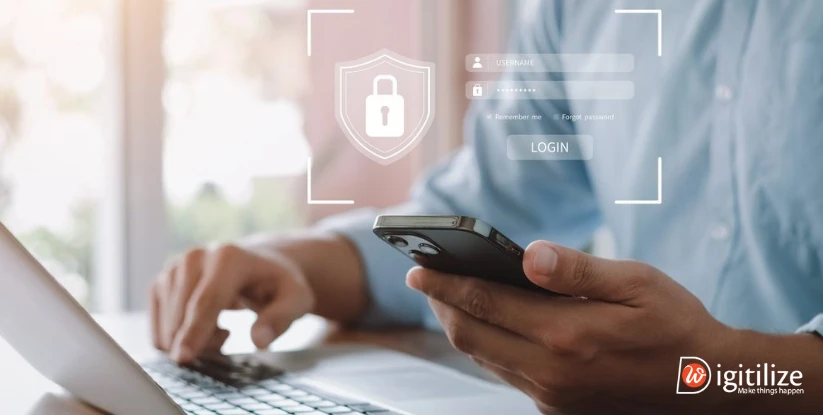Ensure The Security Features of the Website
 It may surprise you to learn that 43% of cyberattacks target small businesses. Today seems like a good time to talk about the website’s security features, according to the team at DigitilizeWeb.
Due to its complexity, creating and maintaining robust website security is an ongoing effort that many website owners overlook. As a website designer for small business, we have seen the disastrous effects that a hack may have on a website and, eventually, a company.
So, are you one of them? If so, then read the blog to ensure the security features of the website.
It may surprise you to learn that 43% of cyberattacks target small businesses. Today seems like a good time to talk about the website’s security features, according to the team at DigitilizeWeb.
Due to its complexity, creating and maintaining robust website security is an ongoing effort that many website owners overlook. As a website designer for small business, we have seen the disastrous effects that a hack may have on a website and, eventually, a company.
So, are you one of them? If so, then read the blog to ensure the security features of the website.
What is website security?
Using website security may shield websites from hackers and other unauthorised users. In order to lessen the impact of attacks add an extra layer of protection and protocol. Maintaining an awareness of emerging dangers, mitigating them, and tracking traffic are just a few components that go into online security and web defence. It’s not an easy undertaking. You have to have faith that the information on your website is safe. Attacks using cyberspace are becoming more frequent and sophisticated. This makes them difficult for security specialists, let alone website designers, to identify. The best website developer UK will put security first, allowing you to concentrate on running your company.
Top security features you must add to your website
These days, every website needs an SSL certificate. The browser-to-browser communication of your visitors is encrypted thanks to an SSL certificate. This is another way to ensure the security features of the website. Using a server for your website prevents hackers from intercepting your login password, card information sent between the two. If you’re looking for a low cost web design company in UK then make sure that they consider the SSL certificate for website security purposes.
Even with the increased knowledge of weak passwords and the necessity of never disclosing login information to other parties, guessing or brute-forcing simple, easily cracked passwords remains one of the most popular methods of credential hacking. If you want to keep your accounts secure, use a long password with many characters and a combination of letters, numbers, and symbols. Never discuss your passwords with anybody or write them down in plain sight on your computer or sticky notes! Always use unique passwords to ensure the security features of the website!
-
Secure domain registration information
Anybody who registers a domain name makes their personal information visible to others. You will be listing discreetly, as opposed to having your first and last name, phone number, and postal address visible to the public. This is another way to ensure the security features of the website. Public access will be restricted to the name, address, and other details. It’s merely another method for enhancing website security.
 Although backups don’t immediately shield you against hackers, they do keep you secure from other unforeseen circumstances. An update for the website that can cause issues, or one that has to be cleaned up after infection. In addition, there are additional circumstances in which you can restore your website back online with just a copy of it. If you know it already or you need any professional help then find affordable web developer in UK, they will help with this. They are aware of how often a backup may avert an otherwise terrible scenario, we automatically do daily backups of every website we host, which we store for a maximum of 30 days. You can also hire experts for this process, don’t go anywhere considering our online backup services in UK.
Although backups don’t immediately shield you against hackers, they do keep you secure from other unforeseen circumstances. An update for the website that can cause issues, or one that has to be cleaned up after infection. In addition, there are additional circumstances in which you can restore your website back online with just a copy of it. If you know it already or you need any professional help then find affordable web developer in UK, they will help with this. They are aware of how often a backup may avert an otherwise terrible scenario, we automatically do daily backups of every website we host, which we store for a maximum of 30 days. You can also hire experts for this process, don’t go anywhere considering our online backup services in UK.
-
Reduce the login attempts
Unauthorized people frequently attempt to guess your password (or username and password) on the login form by trying several times in a row. This is one of the crucial but simple steps to ensure the security features of the website. Limiting how many unsuccessful login attempts someone may make in a row can allow you to quickly cut them off. Once they cross the threshold, they can’t check in from the IP address they use for one hour.
Some websites can steal your data by using hyperlinks and pictures from your website to display them on their pages. Any cyber security service provider refers to this procedure as hotlinking. Preventing hotlinking is essential since it also impacts your site’s bandwidth and storage space. By using specific preventative methods, you may shield your website from the theft of your data.
Bots are used by search engines to crawl webpages in order to aid in efficient indexing and ranking. The same method may be used by hostile spider bots to get information, which can then be sold or used maliciously. Your websites may be overtaken by bots, which would cause distorted analytics and exaggerated traffic figures. Bots are another potential source of distributed denial of service attacks (DDOS). They overwhelm your website by assaulting it from several different systems, which overloads your network and slows down or crashes your website completely. With the use of accessible online technologies, an affordable web developer in UK who is security-conscious would take precautions against malevolent bot assaults.
Ensuring the privacy and unavailability of information stored by your website on visitor computers is ensured by protecting cookies. This is one of the crucial but simple steps to ensure the security features of the website. Client-side scripts and cross-site scripting vulnerabilities are prevented from using store cookies by HttpOnly cookies, which limit access to cookies. This has to be turned on for the extra security to work with contemporary browsers that support HttpOnly. Users who use non-supporting browsers will continue to get standard cookies.
-
Must have anti-malware program
There were 812.67 million malware infections in 2018. According to research conducted that year, ransomware assaults increased by 350% globally. You will see from this figure how crucial it is to create fundamental website security procedures in order to protect your website from viruses. Ransomware is one type of harmful software that causes a significant amount of collateral damage. An intense assault starts the moment a hacker places ransomware programs on your website. Additionally, this can incur huge costs for your company to ensure the security features of the website. A ransomware program typically locks you out of your website and encrypts its content. This implies that unless you pay a ransom for the decryption key, you will not be able to view the content of your website.
-
Uncertain Header Information
Publicising your web server’s type and version online only helps hackers who want to get access to it. Attackers can concentrate their efforts on known vulnerabilities for the particular web server you’re running by restricting the window to a certain platform or version. In the case of X-Powered-When available, by headers, server information headers, and ASP.NET headers. It is advised as best practice to hide these headers and provide visitors no way to identify themselves. These headers are still accessible on a lot of production servers, most likely without their knowledge, because this is not the standard setup.
-
Protect Your Own Electronic Devices
The security of your website is in danger if your devices are not sufficiently safe. By using your own computer, hackers can obtain your secure website’s FTP login credentials. No matter how many security precautions you take, one of the simplest methods for hackers to attack your website is to use your personal devices as a gateway. This is another way to ensure the security features of the website. Strong firewalls and antivirus and anti-malware software should be installed on your personal computer. To block any access to your website, your staff members must also make sure that their own devices are safe.

Two-factor authentication (2FA) is another name for dual-factor login. It adds an extra layer of protection to your accounts. Instead of just a password, you need two steps to log in. This makes it harder for hackers to break in.
For example, single-factor authentication (SFA) only needs one thing—like a password. But with 2FA, you need two items. Think of your bank account. You use both your debit card and PIN to get money from an ATM. That’s 2FA in action.
A domain provider that doesn’t offer 2FA is a red flag. It means they don’t take your security seriously. You should avoid working with them.
Now, let’s look at more security features of the website that you should focus on:
-
Use strong passwords: Don’t use common or easy words. Mix letters, numbers, and symbols.
-
Protect domain info: Keep your domain name registration private. Hackers can use your public data to launch attacks.
-
Get SSL certificates: They encrypt your website data. This keeps your visitors safe.
-
Update your software: Outdated tools and plugins are easy targets for cybercriminals.
So, why should website owners care about the security features of the website?
Because a secure website builds trust. Visitors are more likely to stay and buy when they feel safe. It also protects your data, brand, and income. In short, security is not an option—it’s a must.
Top benefits of website security
-
Keep customer data secure
An SSL certificate is a security feature that encrypts data transit between the web server and the browser. It establishes a secure communication tunnel to prevent third parties from interfering with the current data transfer. During the interaction, client information such a bank account, credit/debit card, login, password, etc., could be expose. If hackers manage to get their hands on them, they can use them to harm the consumer or sell them on the dark web. SSL safeguards client data and aids in preventing that.
The number of visitors that your small company website receives these days can be greatly impacted by having high search engine rankings. Website search engine optimisation, or SEO, is crucial to raising your ranks. Putting money into website security helps you stay away from search engine penalties for content that is insecure. As a result, it enhances your website’s SEO. Therefore, having a secure website will help your small business get more exposure to potential clients and indirectly raise your search engine position.
If your website has suspicious activity, local anti-virus software may warn users to leave right away. This keeps your visitors safe, but it also creates a bad first impression. Most people won’t return to a site that seems unsafe. A slow or broken website can push potential customers away. They’ll go to a competitor instead.
That’s why website security matters. When your site is safe and fast, users trust it. More people will stay, explore, and buy from you. High-quality website security protects your site. It also improves speed and keeps everything running smoothly. In the long run, it helps increase your website visitors and conversions.
Consumers who don’t feel comfortable making purchases from a website will not do so. Potential buyers would avoid purchasing from an insecure website and search for better website choices elsewhere since Google plays a significant role in alerting users not to do so. But your chances of attracting repeat business are excellent if your website has a safe conversion rate optimisation.
Frequently Asked Questions
At DigitilizeWeb, we understand the critical importance of safeguarding our users against phishing attacks. In addition to robust backup and restore services, we have implemented a multi-layered security approach to mitigate the risks associated with phishing.
Regular audits help identify and address potential vulnerabilities promptly, ensuring that security measures are robust and up-to-date. Additionally, after any significant updates or changes, need an immediate security check to maintain the highest level of protection.
By employing advanced encryption protocols (SSL/TLS) to secure your personal information during transmission. Additionally, the servers are protected by robust firewalls to prevent unauthorized access.
We are committed to protecting your privacy. Our privacy policy outlines the information we collect, how it is used, and the measures taken to keep your data confidential. We adhere to applicable data protection laws and regulations.
Yes, you have access to security settings allowing you to monitor login history, enable notifications for unusual activities, and manage devices linked to your account.
 It may surprise you to learn that 43% of cyberattacks target small businesses. Today seems like a good time to talk about the website’s security features, according to the team at DigitilizeWeb.
Due to its complexity, creating and maintaining robust website security is an ongoing effort that many website owners overlook. As a website designer for small business, we have seen the disastrous effects that a hack may have on a website and, eventually, a company.
So, are you one of them? If so, then read the blog to ensure the security features of the website.
It may surprise you to learn that 43% of cyberattacks target small businesses. Today seems like a good time to talk about the website’s security features, according to the team at DigitilizeWeb.
Due to its complexity, creating and maintaining robust website security is an ongoing effort that many website owners overlook. As a website designer for small business, we have seen the disastrous effects that a hack may have on a website and, eventually, a company.
So, are you one of them? If so, then read the blog to ensure the security features of the website.
 Although backups don’t immediately shield you against hackers, they do keep you secure from other unforeseen circumstances. An update for the website that can cause issues, or one that has to be cleaned up after infection. In addition, there are additional circumstances in which you can restore your website back online with just a copy of it. If you know it already or you need any professional help then find affordable web developer in UK, they will help with this. They are aware of how often a backup may avert an otherwise terrible scenario, we automatically do daily backups of every website we host, which we store for a maximum of 30 days. You can also hire experts for this process, don’t go anywhere considering our online backup services in UK.
Although backups don’t immediately shield you against hackers, they do keep you secure from other unforeseen circumstances. An update for the website that can cause issues, or one that has to be cleaned up after infection. In addition, there are additional circumstances in which you can restore your website back online with just a copy of it. If you know it already or you need any professional help then find affordable web developer in UK, they will help with this. They are aware of how often a backup may avert an otherwise terrible scenario, we automatically do daily backups of every website we host, which we store for a maximum of 30 days. You can also hire experts for this process, don’t go anywhere considering our online backup services in UK.


